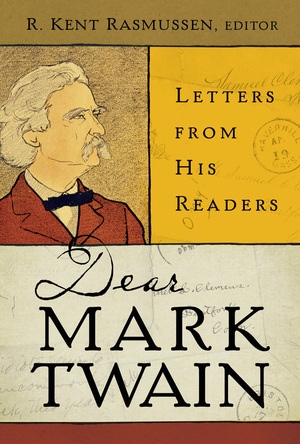A voracious pack-rat, Mark Twain hoarded his readers' letters as did few of his contemporaries. Dear Mark Twain collects 200 of these letters written by a diverse cross-section of correspondents from around the world—children, farmers, schoolteachers, businessmen, preachers, railroad clerks, inmates of mental institutions, con artists, and even a former president. It is a unique and groundbreaking book—the first published collection of reader letters to any writer of Mark Twain's time. Its contents afford a rare and exhilarating glimpse into the sensibilities of nineteenth-century people while revealing the impact Samuel L. Clemens had on his readers. Clemens’s own and often startling comments and replies are also included.
R. Kent Rasmussen’s extensive research provides fascinating profiles of the correspondents, whose personal stories are often as interesting as their letters. Ranging from gushing fan appreciations and requests for help and advice to suggestions for writing projects and stinging criticisms, the letters are filled with perceptive insights, pathos, and unintentional but often riotous humor. Many are deeply moving, more than a few are hilarious, some may be shocking, but none are dull.
Dear Mark Twain Letters from His Readers
About the Book
Reviews
“Just when we thought there was nothing else to learn about Twain, another facet of that literary jewel appears. . . . Well-selected, thoroughly researched and thoughtfully annotated—a surprising, welcome addition to the apparently endless Twain shelf.”—Kirkus Reviews
“It is a special delight to read Twain’s interactions with the readers who made him 19th-century America’s most popular writer.”—Alexander Nazaryan New York Daily News
“Kent Rasmussen has done it again: he has come up with a book that will give every Twainiac and lots of others with only a casual interest in Mark Twain much enjoyment and a non-trivial amount of insight into one of the most remarkable writers the world has ever known. . . . . Reading other people's mail can be deliciously titillating in any era. Eavesdropping on epistolary conversations that involve Sam Clemens are a special treat. . . . Kent Rasmussen deserves our thanks for having produced an impressive work of scholarship which is as much fun to read as it is illuminating and instructive.”—Shelley Fisher Fishkin Mark Twain Forum
“A magnificent, remarkably researched book by Twain scholar R. Kent Rasmussen, featuring adulation, criticism, and a range of audacious requests Clemens received between 1861 and his death in 1910 from correspondents spanning school children, businessmen, farmers, political activists, con artists, teachers, and housewives.”—Maria Popova Maria Popova, Brain Pickings
"The content is diverse and intriguing. . . . Verdict: Rasmussen is clearly an expert curator and researcher. Fans of Twain and most libraries will want to secure a copy."—Stacy Russo Library Journal
"A devoted Samuel Clemons/Mark Twain fan will want to pick up this book and will appreciate Rasmussen’s research."—Chris Stuckenschneider Missourian
"This series of letters makes delightful reading."—Aron Row San Francisco Book Review and Sacramento Book Review
"Over the past two decades Kent Rasmussen has consistently produced some of the most useful, practically minded, and accessible scholarship in Mark Twain studies. With Dear Mark Twain: Letters from His Readers, Rasmussen comes through again. . . . Rasmussen enlarges what we know of Mark Twain from his correspondence as it provides the most substantive understanding yet of who were buying his books and reading him in newspapers and magazines at the turn of the century. As such, this collection will be of interest to Mark twain specialists, students of American literary and cultural studies, and general readers alike."—Joseph Csicsila Mark Twain Annual“Dear Mark Twain leaves the reader with little doubt as to the singular and powerful chord that this author struck in the hearts of the American public.”—Ron Powers, from the Foreword
"Kent Rasmussen has done valuable work researching for the nuggets in the goldmine of Mark Twain's work."—Hal Holbrook
“Working with seemingly unpromising materials, R Kent Rasmussen has produced a remarkable and highly readable book. Dear Mark Twain provides us with a picture of Twain’s readership, by turns adulatory, critical, advice- and autograph- seeking, and money begging; but the volume but also tells us much about American readers generally during Twain’s writing life. The book is scrupulously edited and superbly annotated, and includes Twain’s usually terse and biting comments. A triumph.”—N. John Hall, Distinguished Professor Emeritus, CUNY Graduate Center and author of Correspondence: An Adventure in Letters.
"Twain remains a beloved, even familial, figure, so none should be surprised that complete strangers wrote to him with every imaginable request, compliment, and even criticism. Dear Mark Twain takes this correspondence and moves Twain scholarship in an intimate new direction that will surely captivate a wide audience. The chronologically arranged letters with Clemens’s own notations could stand alone, but Kent Rasmussen’s rich scholarship places these letters and their writers in context, and his elegant and insightful postscript to each missive at once clarifies, informs, and entertains."—Cindy Lovell, Executive Director of the Mark Twain Boyhood Home & Museum
Table of Contents
List of Illustrations
Foreword by Ron Powers
Introduction
Note on Texts
Letters
1861–1870
1871–1880
1881–1890
1891–1900
1901–1910
Note on Sources
Acknowledgments
Index













